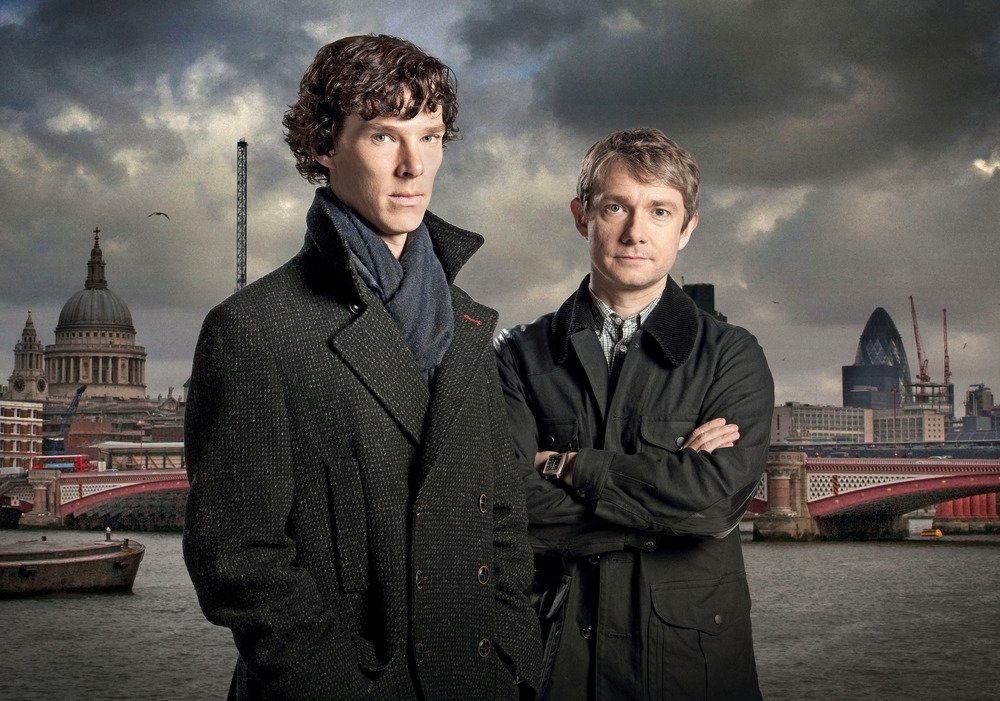Knives Out: Whatever you think you know, you don't...
The Whodunnit: Cinematic Metaphor
The murder mystery. A classic genre in film, television and literature, to which we are indebted for iconic characters like Sherlock Holmes, Hercule Poirot and Jane Marple. Nothing overly complicated, as far as narrative structure goes, generally speaking: murder is committed, the detective works to find the killer, then at the story’s climax, the hidden plot is revealed in its entirety.
 |
| Popular sleuths include such names as Holmes & Watson, Miss Marple, and Poirot |
But that’s what I think makes the whodunnit actually attractive. You can put in as much or as little effort as you want, and ultimately you’ll still come out on top with a finished story, a mystery solved, and a job well done. Congratulations!
I’m very late to the party but I recently watched Knives Out and whilst it certainly has a star-studded cast and a clever story, some of the most interesting parts of the film weren’t actually on screen, but rather hidden, essential parts of the film.
As you might’ve guessed from the very subtle hint in this post’s title, I think genre works in mysterious ways in this film. The crux of it is narrative structure, and the expectations the audience has when going to see a whodunnit. As described, the whodunnit has a relatively stable, ironically predictable structure which ends with a satisfying conclusion: you find out who done it.
The whodunnit as a metaphor for cinema then comes into play in terms of escapism. Escapism, you might argue, is one of the major reasons why people watch films and TV shows and plays or read books. In its structure and content, the whodunnit is a textbook example of art providing an escapist opportunity.
Firstly, the subject of the whodunnit is almost always murder. Outside of fiction, murder is a horrific, barbaric and obviously illegal act, but within the safe confines of the screen, the stage or the page, murder is quite literally entertaining. Is that not concerning? Why does no one seem to take issue with the gratuitous glamourisation of murder in fiction? Probably because it’s just that: fiction. As audiences, fictional murder is acceptable and even entertaining because it remains restricted to fiction, and it cannot harm us in our real lives beyond giving overactive imaginations a vigorous shake. We can live the dangerous thrill of a murder mystery without ever being threatened by its true implications and impacts.
The narrative structure of the whodunnit is absolutely essential to this idea. If the audience is promised a satisfying conclusion in which we are given a full debrief on the events leading up to and including the murder with an explanation of all the clues and hints throughout the story, we can rest easy with our closure, knowing that the murder is a contained action. Ultimately, the audience can quite literally go on with their lives as if nothing happened - the story is wrapped up, loose ends are tied, and fiction reigns supreme.
Now, to Knives Out. If you haven’t seen Knives Out yet I hope you’re OK with spoilers; take a wild guess at what the rest of this post is going to cover. What makes Knives Out an excellent example of the whodunnit doing exactly what it’s supposed to do, whilst also breaking all the rules.
The initial “well that was unexpected” moment, I think it’s safe to say, arrives relatively early on in the film in the flashback where we are given the solution to the case. That puts the audience in an awkward spot. We’ve just had the ending forcibly spoiled for us, what are we supposed to do now? The film then asks us to find a new reason to stick with it, and that comes in the form of Marta Cabrera, Harlan’s beloved nurse, and her attempt to hide what is essentially a horrific accident to prevent putting her undocumented mother in danger.
 |
| Medication mix-up, with deadly consequences for both Harlan and Marta |
The scene is the perfect example of this false predictability which keeps the audience engaged, allowing them to feel in control whilst also surprising them. Harlan’s instructions in the voiceover align with the actions of Marta on screen, satisfying us with the predictable paralleling of audio and visuals. It also lulls the audience into a false sense of security, thinking that we have all the answers, before the film’s climax reveals that we don’t, in fact, know better.
By unravelling the genre’s narrative structure, only to deliver on the expected closure and explanation, the film does the whodunnit brilliantly. The fabled “twist” is not only written in the narrative, but it also subverts the very idea of narrative.
Part of Knives Out’s success I think comes from this radical narrative experiment. The film completely throws off our expectations, but then returns to the traditions of the genre for the climax - it provides us with that closure and satisfaction which the audience wants. It’s interesting that the genre can have successful films like Knives Out, unconventional and raucous, alongside Agatha Christie’s classic Poirot stories. Both are easily categorised as whodunnits, but they work very differently. I suppose that phenomenon is something applicable to cinema more widely; films can exist in the same genre, whilst also being wildly different.
The point about the whodunnit as a metaphor for cinema is partly the idea that genres can have so much internal range, but more importantly it’s escapism. The whodunnit lets us dip our toes into danger, play at being detectives, imagine we know things that something else doesn’t. We can fulfil some fantasy of knowing, whilst also expecting to be surprised and impressed at the end of it all. We can have our false sense of power, and we’re happy with it being only false because we know we’ll get what we want in the end. In many ways - though obviously not always or everywhere - this is what film does or at least attempts to give us.

Comments
Post a Comment